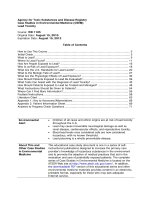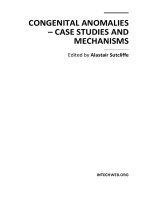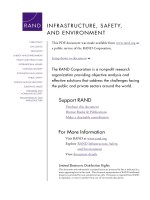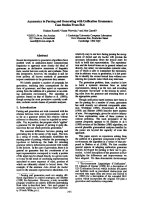Learning from deaths case studies
Bạn đang xem bản rút gọn của tài liệu. Xem và tải ngay bản đầy đủ của tài liệu tại đây (838.57 KB, 38 trang )
Learning from deaths: case
studies from trusts
December 2017
We support providers to give patients
safe, high quality, compassionate care
within local health systems that are
financially sustainable.
Contents
Foreword ................................................................................................................. 4
1. Critical care memorial service
(University College London Hospitals NHS Foundation Trust) ............................. 5
2. Bereavement support through the intensive care unit
(Royal Berkshire NHS Foundation Trust) ............................................................. 7
3. Changing the Learning from Deaths process with rapid process
improvement (Gateshead Health NHS Foundation Trust) ................................ 10
4. Role of the family liaison officer (Southern Health NHS Foundation Trust) ... 12
5. Debriefing sessions for staff (Lewisham and Greenwich NHS Trust) ............. 15
6. Embedding electronic death certification
(King's College Hospital NHS Foundation Trust) ............................................... 17
7. Role of the bereavement office in co-ordinating review and support
(St George's University Hospitals NHS Foundation Trust) ................................. 19
8. Embedding the learning disability mortality review process
(North Tees and Hartlepool NHS Foundation Trust) .......................................... 22
9. Improving performance relating to hospital standardised mortality ratio
(Sherwood Forest Hospitals NHS Foundation Trust) ......................................... 24
10. Role of the mortality review panel
(Portsmouth Hospitals NHS Foundation Trust) ............................................... 27
11. Implementing and integrating a Learning from Deaths dashboard
(West Suffolk NHS Foundation Trust) .............................................................. 30
12. Region-wide collaboration
(West of England Academic Health Science Network) .................................... 33
13. Working across Greater Manchester on mortality review
(Penine Care NHS Foundation Trust) .............................................................. 35
Foreword
A year since the Care Quality Commission published Learning, candour and
accountability: A review of the way NHS trusts review and investigate the deaths of
patients in England and nine months since the National Quality Board issued
National guidance on Learning from Deaths in March 2017, there has been a
significant shift in expectation about how trusts should respond to, review and learn
from the deaths of people in their care.
NHS Improvement has been supporting trust boards to embed the guidance in the
work of their organisations. We have been clear that the change required of trust
boards is one of culture and leadership, rather than one of process and counting.
Crucially, it requires a commitment to the spirit and not just the letter of the
guidance.
The requirement on organisations is clear. It is not simply to have a robust process
for reviewing deaths in care, important though this is. Trusts need also to engage
with and support bereaved families, to provide mechanisms for staff support and
debriefing and to ensure active and robust board oversight. Perhaps most
importantly learning needs to be translated into sustainable action to improve the
way we look after the people in our care.
This collection of case studies demonstrates the range of actions that trusts are
taking, as well as the challenges they face and how they are seeking to overcome
these. We hope they provide inspiration and useful tips for other organisations.
We recognise there is more to do to ensure that the NHS truly draws on all possible
learning from the deaths of those in its care. But these case studies serve to
illustrate some of the important progress made since the national guidance was
issued in March 2017.
I am grateful to all the trusts that have shared their work for this publication.
Kathy McLean
Executive Medical Director, NHS Improvement
4 | > Foreword
1. Critical care memorial
service
University College London Hospitals NHS
Foundation Trust
University College London Hospitals NHS Foundation Trust (UCLH) is a large trust
made up of five teaching hospitals. It has over 8,100 staff looking after more than a
million patients every year.
UCLH has developed a comprehensive Learning from Deaths policy which it is in
the process of implementing.
Supporting bereaved next of kin in critical care
To improve the support UCLH gives to bereaved relatives, in September 2017 the
critical care team held its first memorial service for those who have died in its care.
All relatives bereaved in the last year were invited.
At the service, the names of all those who had died on the unit over the last year
were read out, the critical care nursing team sang a song, eulogies were given by
family members or staff on their behalf, and families were asked to light a flame of
remembrance and join in a minute’s silence. Family members were also given a gift
of remembrance – bulbs to plant at home.
Families shared stories of their loved ones, talked to other relatives about their loss
and if they wished could seek emotional support from the multidisciplinary team
members present at the service, one of whom was a clinical psychologist.
Families have since told the critical care team how much the service has helped
them come to terms with their loss and to realise that they are not alone. Many said
it had enabled a release of grief and that this had given them some closure to their
loss.
5 | > 1. Critical care memorial service
Staff who took part in the service said it had helped them process their feelings
about the deaths of patients in their care.
We plan to hold another memorial service next year.
Learning points
•
The importance of including families in the development of
bereavement support.
•
Memorial services can be beneficial for families, carers and hospital
staff.
Further information
Please contact:
Meenaxi Patel, General Manager:
John Welch, Nurse Consultant:
Trust policy:
/>%20Learning%20from%20Deaths%20Policy.pdf
6 | > 1. Critical care memorial service
2. Bereavement support
through the intensive care
unit
Royal Berkshire NHS Foundation Trust
Royal Berkshire NHS Foundation trust is one of the largest general hospital
foundation trusts. It provides acute medical and surgical services to Reading,
Wokingham and West Berkshire, as well as specialist services such as cancer,
dialysis and eye surgery to a wider population across Berkshire and beyond.
The trust’s bereavement services, both hospital-wide from the bereavement office
and locally in the intensive care unit (ICU), have provided support to families and
carers for many years.
Bereavement office
A dedicated bereavement team
continually tries to improve care for
families and carers, and has developed its
services over the last five years. It
increasingly provides support and advice
to families and carers on complex
financial issues.
The team asks the next of kin if they have
any concerns about the care their loved
one received. If they do, we tell the quality
governance team, which may consider a
full mortality review. A survey is given to
the next of kin with the death certificate, to
help monitor and improve services further.
7 | > 2. Bereavement support through the intensive care unit
Intensive care unit
The bereavement team on the ICU has provided support to relatives and carers
since 2000. We started by compiling an information booklet specifically for ICU
relatives. This incorporates practical information about death certification and
registration, funerals, the role of the coroner and post-mortem examinations, as well
as information about local bereavement support services.
Working with the hospital chaplains, the ICU team holds memorial services twice a
year for relatives and friends of patients who died in its care; some 70 to 100
relatives and friends attend.
At six to eight weeks following a death, the bereavement team writes to the next of
kin offering them a follow-up appointment. This can be a medically focused meeting
with a consultant to go over what happened, or it can explore how they are feeling
and what can be done to help. We do not offer counselling but can assess whether
someone needs to be referred for this.
We review all deaths on the ICU, compiling a monthly list of morbidity and mortality
that is presented at the clinical governance committee. If there are concerns that a
death may be in some way due to care given, the case is presented to the mortality
surveillance group.
Mortality surveillance group
Learning points and themes from the mortality surveillance group are reported to
the clinical outcomes and effectiveness committee. These are recorded each month
on a slide given to the specialty clinical governance meetings and published on the
trust’s intranet. To share learning across organisations, our medical director meets
quarterly with the medical directors from local trusts to share themes and discuss
issues.
8 | > 2. Bereavement support through the intensive care unit
Learning points
•
It is important that the next of kin is asked what bereavement support
they need.
•
Learning should be spread as widely as possible.
Further information
Please contact:
Sheila Hill, Bereavement Care Sister, Intensive Care Unit:
Natalie Shaw, Bereavement Officer:
Trust policy: />
9 | > 2. Bereavement support through the intensive care unit
3. Changing the Learning
from Deaths process with
rapid process improvement
Gateshead Health NHS Foundation Trust
Gateshead Health NHS Foundation Trust, known locally as QE Gateshead,
provides a range of health services at Queen Elizabeth Hospital, Dunston Hill Day
Hospital, QE Metro Riverside, Bensham Hospital, Blaydon Primary Care Centre,
Washington Primary Care Centre, as well as a specialist unit in Houghton-le-Spring.
Approach
The mortality and morbidity council at QE Gateshead agreed that running a rapid
process improvement workshop was the appropriate way to improve and change
practice quickly throughout the organisation. A week was set aside for key internal
stakeholders to meet members of the morbidity and mortality council. These
stakeholders included surgeons, physicians, nurses and staff from coding,
information technology, the bereavement office, secretarial and administration.
The current process for each of the business units was assessed. Processes were
reviewed and refined where necessary to ensure that all deaths in the trust can be
recorded in one place, using a database linked to the MEDWAY system. All
processes associated with the Learning from Deaths policy were standardised and
a standard operating procedure (SOP) was created; for example, a green box
system on all wards for notes to be reviewed.
The trust recognises the importance of gaining the views of relatives and carers
when learning from deaths. We now send a letter and feedback form to all
bereaved relatives/carers six weeks after the death of the patient. Lessons learned
will be shared via service lines, through the business unit safe care meetings as
well as monthly at the mortality and morbidity steering group.
10 | > 3. Changing the Learning from Deaths process with rapid process improvement
What has been achieved?
Since introducing the SOP for the first- and second-level reviews the approach to
reviewing deaths has been consistent across the trust, with 76% of all deaths
currently reviewed. By involving relatives in the Learning from Deaths process we
have added a new qualitative dimension to our reviews. Much of the feedback from
families is praise for care our staff have given. Where things have not gone well we
are learning invaluable lessons and these are being used to shape future projects.
Lessons so far concern how we communicate, including improving the DNACPR
(do not attempt cardiopulmonary resuscitation) discussion, emergency care plans,
breaking bad news or information about general care planning.
Learning points
•
Lessons learned need to be used to target staff training, such as
communication training for the ward teams in discussing DNACPR
with carers and relatives.
•
It is essential that the concerns raised by families and carers are
shared with ward teams as well as the wider organisation.
Further information
Please contact: Joanne Coleman, Strategic Safeguarding Lead:
Trust policy:
/>g%20and%20Learning%20from%20Deaths%20v1.pdf
11 | > 3. Changing the Learning from Deaths process with rapid process improvement
4. Role of the family liaison
officer
Southern Health NHS Foundation Trust
Southern Health NHS Foundation Trust provides community health, specialist
mental health and learning disability services to people across the south of
England. The trust employs around 5,500 staff over 200 sites, including community
hospitals, health centres, inpatient units and social care services.
Southern Health has been undertaking work for several years as part of NHS
England’s commissioned review by Mazars – ‘Independent review of deaths of
people with a learning disability or mental health problem in contact with Southern
Health NHS Foundation Trust between April 2011 to March 2015’, and our own
commissioned external review, ‘Experience of families in the investigation process’.
Family liaison officer role
In December 2016 Southern Health recruited an experienced family liaison officer
(FLO) to support the families and carers of those who die while in our care. The
successful applicant has previously worked as a coroner’s officer and is Cruise
trained in bereavement counselling.
The FLO supports all bereaved families and carers whether or not a Serious
Incident investigation is ongoing. The FLO also supports those involved in nondeath serious harm incident investigations and complex complaints.
All reported deaths, Serious Incidents and complex complaints are case reviewed
using a 48-hour panel process and the initial referral for FLO involvement can be
made at this point by any staff member. Some cases are referred later in the
investigation process depending on the needs of individuals.
The FLO has received over 130 referrals and given support tailored to what an
individual needs. This can include home visits, telephone calls, text messages, and
support at meetings with investigating officers, clinicians and at inquests. The
12 | > 4. Role of the family liaison officer
length of time over which support is given also depends on the individual; the
longest active case has lasted nine months.
What were the challenges?
The FLO was a new post for the trust and the need for it had to be proven. An
independent consultant who reviewed families’ experience of the investigation
process advised against the role, stating that the responsibility was that of the
investigating officer.
Members of the public have also raised concerns that the FLO is part of the quality
governance team and is line managed by the head of patient safety, incident
management and legal.
We strongly felt that an individual who was independent of any investigation but
who understood the trust’s processes was needed to guide and support families
and carers through them.
What are the results?
Surveys of families and carers show the role has been positively received and
highlight areas where the trust can improve its investigations.
The family liaison role is still evolving and our ongoing review will recommend next
steps.
Learning points
•
It is not just bereaved families and carers who need support but those
participating in any Serious Incident or complainant investigation.
•
There is very limited support externally for bereaved people and this
can be difficult to access. The FLO has worked with the third sector to
develop contacts for ongoing support to the people who require it.
•
Families and carers value the support and information, independent
from the investigation process, that the FLO provides. Feedback has
been overwhelmingly positive.
13 | > 4. Role of the family liaison officer
Further information
Please contact:
Helen Ludford, Associate Director of Quality Governance:
Dr Sarah Constantine, Interim Medical Director:
Elaine Ridley, Family Liaison Officer, would be happy to share any information
regarding her role:
Trust policy:
/>%7e
14 | > 4. Role of the family liaison officer
5. Debriefing sessions for
staff
Lewisham and Greenwich NHS Trust
Lewisham and Greenwich NHS Trust was formed on 1 October 2013 through the
merger of Lewisham Healthcare NHS Trust and Queen Elizabeth Hospital. The
trust provides healthcare for Lewisham, Greenwich, Bexley and other parts of south
east London.
Regular staff debriefings in the intensive care unit
The intensive care unit (ICU) at Lewisham Hospital holds weekly Learning from
Deaths debriefing sessions for its junior doctors. These sessions are facilitated by
consultants, and members of the wider multidisciplinary team can also attend.
The debriefing sessions work as follows:
•
•
no PowerPoint, no flipcharts and no minutes taken
•
the person who added the patient to the debrief list briefly summarises the
case for the group and explains their reasons for raising the case – for
example, difficult decision had to be made, near miss or complication,
emotionally distressing case
•
group members have an opportunity to share how they feel about the case
and events surrounding it
•
the group decides what points can be learned from the case.
ground rules are stated at the start of each session to ensure it provides a
confidential, non-threatening environment for learning
After the session, brief learning points are noted on the shared drive. This informs
colleagues not present at the debriefing and is useful for tracking progress.
One junior doctor said: “The debrief holds a tremendous amount of value following
a stressful situation and acknowledges the impact of human factors on clinical
practice”.
15 | > 5. Debriefing sessions for staff
Learning points
•
Consultants play an important role in ensuring staff debriefings
become standard practice and in creating a safe environment for
reflection and learning.
•
The debrief is a critical part of the learning process, designed to
highlight lessons learned, and provide an opportunity to reflect on
performance and develop strategies to improve practice.
•
The debrief also has an important role in supporting staff working on
the unit.
Further information
Please contact: Dr Ashraf Molokhia, Consultant ICM and Anaesthetics:
Trust policy:
%2Fdownload.cfm%3Fdoc%3Ddocm93j
ijm4n2133.pdf%26ver%3D2571&usg=AOvVaw1dTIaLnBeZszDX8hyZYz6
16 | > 5. Debriefing sessions for staff
6. Embedding electronic
death certification
King’s College Hospital NHS Foundation Trust
King’s College Hospital NHS Foundation Trust is a large trust comprising King’s
College Hospital (KCH) and several smaller sites including Princess Royal
University Hospital, Orpington Hospital and Queen Mary’s, Sidcup.
Process for systematic mortality review
Routine mortality monitoring underpins KCH’s approach to patient outcomes
surveillance and clinical quality improvement. We are developing and promoting a
culture of systematic mortality monitoring across the organisation by requiring
divisions to adopt a structured mortality review process for each of our care groups.
Electronic death certification
All deaths at KCH (Denmark Hill site) are recorded through electronic death
certification (eDC) on the electronic patient record at the time the written death
certificate is completed in the bereavement office. This platform for electronic death
certification was developed in-house and all junior doctors are trained in how to
complete the eDC shortly after induction.
This process has enabled the complete identification and record of all deaths in the
hospital. Use of eDC has also enabled KCH to quantify consultant input into death
certificate wording, increase consultant attribution to cases and improve our ability
to audit the timeliness of paper death certification. We consider the latter
particularly important to bereaved families and carers and for this reason it is an
important quality measure for us.
The eDC is a first-stage review and a key function of it is to identify those cases
needing a full structured judgement review. Use of the eDC has been
transformative for KCH – for example, before its introduction KCH had limited ability
17 | > 6. Embedding electronic death certification
to identify those cases involving people with a severe mental illness or learning
disability.
Next step and sustainability
KCH plans to roll out the eDC to the Princess Royal University Hospital. KCH will
maintain clinician engagement by demonstrating to them the benefits of data
collection to identify deaths and quality failings in this area and how this relates to
improvements in patient care.
Other planned work in our Learning from Deaths strategy is ongoing joining up with
other relevant policies and systems such as the duty of candour policy and patient
safety systems. This should help avoid duplication of effort and improve timeliness.
Learning points
•
Information technology support is integral to the development of
systems such as the eDC.
•
Gaining clinician engagement at all levels, both during development of
processes and in the longer term, is critical.
Further information
Please contact: Professor William Bernal, Corporate Medical Director:
Trust policy: />
18 | > 6. Embedding electronic death certification
7. Role of the bereavement
office in co-ordinating
review and support
St George’s University Hospitals NHS Foundation
Trust
St George’s University Hospitals NHS Foundation Trust employs nearly 8,500 staff
and serves a population of 1.3 million across south west London. Some services –
cardiothoracic medicine and surgery, neurosciences and renal transplantation –
cover an additional 3.5 million people from Surrey and Sussex.
Consultant-led approach to learning from deaths
St George’s has introduced daily consultant-level support for the bereavement
office and daily ‘independent’ review of deaths. All reviewers are trained in the
Royal College of Physicians’ structured judgement review process. Most deaths are
reviewed independently, with data and learning reported to the board.
Consultant support and mortality review in the bereavement office help improve the
information and support given to families, and with escalating their concerns. These
measures also support clinical teams with improved and timely death certification
and with referral to the coroner. Importantly, they have helped identify clinical
issues that are then fed into risk and/or quality improvement programmes.
An established direct link between the mortality review team and the risk team
ensures all incidents of significant harm are rapidly identified to allow timely support
for families and investigation either at local or trust level. There is also a direct link
to the Child Death Overview Panel (CDOP) and the Learning Disability Mortality
Review (LeDeR) programme.
IT solutions mean we can identify deaths in almost ‘real’ time and collate all
reviews, enabling identification of themes and development work. We have
19 | > 7. Role of the bereavement office in co-ordinating review and support
processes for raising concerns with other care providers and work is underway with
another local trust to investigate care across hospitals and to share learning.
Challenges and how these were overcome
Staff capacity and resource are a challenge. Conducting mortality reviews well and
providing timely support to families and clinical teams are resource intensive. But
with board-level support, both executive and non-executive, we have managed the
challenges of providing appropriate staff capacity and resource. St George’s has
resourced consultant time for daily bereavement office support and independent
mortality case review. The trust has also created a new management post by
reconfiguring the clinical effectiveness team, dedicated to mortality review.
Since publication of the national guidance on Learning from Deaths, we have
continuously improved our mortality review processes with better support and
improved cross-reference with other information.
Next step and sustainability
We will continue to strengthen our processes and the support we give to families
and teams. The imminent appointment of a responsible manager should help to
ensure reports and learning are disseminated well and embedded into practice. We
plan to continue to strengthen the review process, train more reviewers and
improve the learning across care providers. We will continue to work with CDOP
and the LeDeR programme.
Learning points
Board-level support is essential.
IT solutions are essential to identifying deaths and accurate data
reporting.
• Mortality review processes and outcomes need to fit seamlessly
into other trust governance structures.
20 | > 7. Role of the bereavement office in co-ordinating review and support









